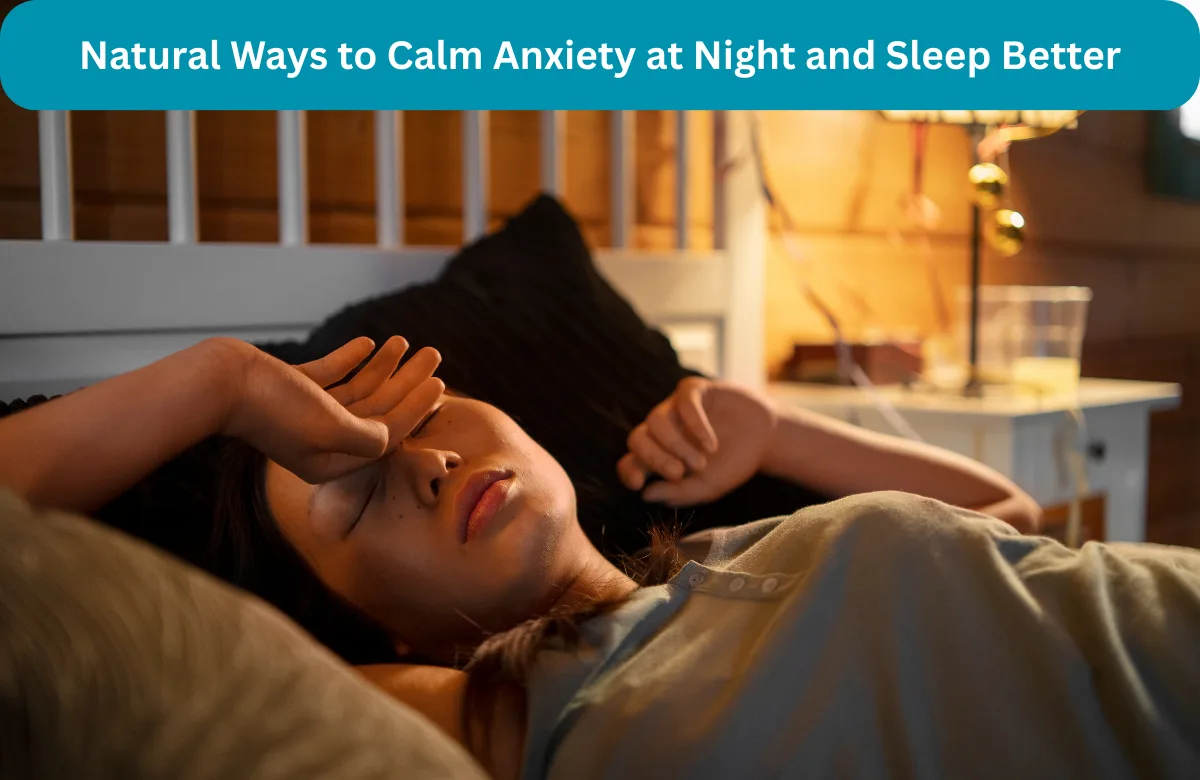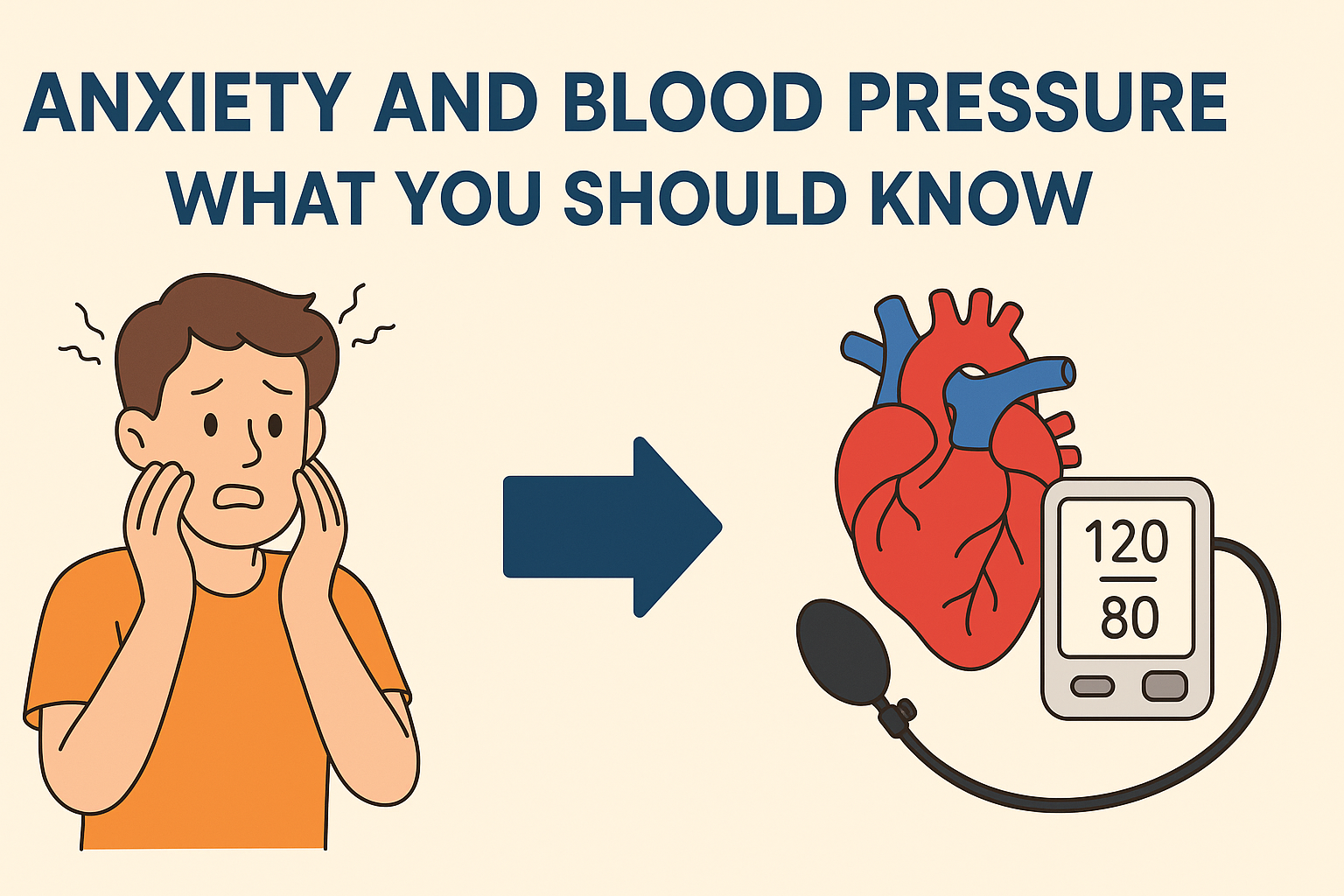Natural Ways to Calm Anxiety at Night and Sleep Better
Discover expert-backed, natural solutions to ease nighttime anxiety and finally get the restful sleep you deserve.
Understanding Nighttime Anxiety: What Causes It?
Nighttime often brings quiet—but for many, that silence amplifies anxious thoughts. As daily distractions fade, your brain begins to process unresolved concerns, and that’s when anxiety tends to peak.
A major factor behind this is cortisol—the body’s stress hormone—which is supposed to decline at night.
But in anxious individuals, cortisol may remain elevated, keeping the mind and body on high alert.
This triggers a vicious cycle: anxiety leads to poor sleep, and inadequate rest intensifies anxiety. Contributing factors such as late-night screen time, erratic sleep schedules, and caffeine intake exacerbate this imbalance.
Pinpointing these patterns allows you to address the root causes and begin implementing calming, restorative habits.
Common Causes of Nighttime Anxiety
| Cause | Explanation |
|---|---|
| High Cortisol Levels | Stress hormone stays elevated, blocking natural relaxation cues. |
| Rumination | Overthinking daily events or future worries when the mind is idle. |
| Sleep Disorders | Insomnia and anxiety often feed into each other. |
| Poor Lifestyle Habits | Late caffeine, blue light, and irregular sleep routines interfere. |
Building a Relaxing Nighttime Routine
Creating a soothing nighttime ritual is a critical first step in reducing anxiety.
Repeating relaxing activities each night helps signal to your brain that it’s time to wind down.
Begin by turning off all screens at least one hour before bed to support melatonin production. Shift to low-stimulation tasks like reading a comforting book, dimming the lights, or taking a warm bath.
Make your bedroom a sanctuary for rest: cool, quiet, and completely dark. Soft music or white noise can also create a calming atmosphere.
Over time, this environment conditions your mind to associate bedtime with safety and relaxation—making it easier to fall asleep and stay asleep.
Breathing Techniques to Reset Your Nervous System
Breathing deeply and intentionally is one of the quickest ways to interrupt the body’s stress response.
This calms your heart rate, lowers cortisol, and eases your transition into sleep.
Box Breathing is one such method: inhale, hold, exhale, and pause for four seconds each.
Another effective option is the 4-7-8 method—inhaling for four seconds, holding for seven, and exhaling slowly for eight.
Practicing these techniques in bed can help calm racing thoughts and coax your body into rest mode.
Just five minutes of deep breathing each night can rewire your nervous system for calm.
Herbal Remedies to Encourage Natural Calm
Nature offers potent, time-tested solutions for calming the mind.
Herbal remedies can be a gentle yet effective way to transition into rest.
Chamomile tea is widely used for its ability to soothe nerves and promote sleep.
Lavender oil, whether diffused or applied topically, has been shown to reduce heart rate and anxiety. Ashwagandha, an adaptogen, helps balance cortisol and builds long-term resilience against stress.
Valerian root enhances GABA, a neurotransmitter that promotes calm and sleep.
Herbal Remedies and Their Benefits
| Herbal Remedy | Benefit |
|---|---|
| Chamomile | Calms the nervous system and promotes restful sleep. |
| Lavender | Reduces anxiety and heart rate; enhances mood. |
| Ashwagandha | Regulates cortisol levels and supports adrenal balance. |
| Valerian Root | Boosts GABA production to quiet the nervous system. |
Journaling to Clear the Mental Clutter
Putting pen to paper before bed can provide a significant sense of relief.
Journaling helps to externalize thoughts, quiet the mental chatter, and reduce pre-sleep rumination.
You might write about what went well that day, list things you’re grateful for, or jot down tomorrow’s to-do list to ease anxiety about upcoming tasks.
Studies show that this simple practice can shorten the time it takes to fall asleep and improve sleep quality overall. It serves as a powerful mental reset, giving your brain permission to rest.
Magnesium’s Role in Reducing Stress
Magnesium is a key mineral that supports over 300 processes in the body—including regulation of the nervous system and stress response.
A deficiency in magnesium can manifest as anxiety, irritability, muscle tension, and insomnia.
Magnesium glycinate and citrate are highly absorbable and particularly effective for calming the body. Before starting any supplement, it’s best to consult a healthcare professional.
You can also increase magnesium naturally through foods like leafy greens, pumpkin seeds, almonds, and dark chocolate.
Lifestyle Habits That May Be Fueling Anxiety
Some habits might seem harmless during the day but wreak havoc at night.
Caffeine consumed even in the afternoon can stay in your system for hours, blocking melatonin and delaying sleep.
Processed sugars can lead to blood sugar spikes and crashes, which disrupt mood and energy regulation.
Alcohol may feel relaxing at first but often fragments sleep later in the night.
By reducing these dietary triggers and aligning your eating and drinking habits with your sleep goals, you support a smoother transition to sleep and better emotional stability overall.
Practicing Mindfulness and Meditation
Mindfulness invites you to focus on the present moment, helping you disengage from anxious thoughts and mental noise.
Meditation offers structured techniques to train your attention—whether you focus on your breath, a mantra, or body sensations.
If you’re just starting out, consider guided meditations that focus specifically on sleep or anxiety relief. Practicing mindfulness for just a few minutes before bed can reset your mental state and invite a deeper sense of calm.
Progressive Muscle Relaxation (PMR)
Progressive Muscle Relaxation is a method where you deliberately tense and release muscle groups one by one.
This practice not only helps you become more aware of physical tension but also guides your body into a deeply relaxed state.
Start at your toes, working your way up through the body. Tense each muscle group for 5–10 seconds, then release slowly.
When integrated into a nightly routine, PMR becomes a physical cue that it’s time to relax and let go.
When to Seek Professional Help
While natural methods offer strong support, there are times when additional help is essential. If your nighttime anxiety persists for weeks or interferes with daily life, a licensed mental health professional can help you get to the root of the issue.
Cognitive Behavioral Therapy (CBT) is especially effective for anxiety and insomnia, helping reframe thought patterns and reduce fear around sleep.
A sleep specialist can also determine if other conditions like sleep apnea are contributing to your struggle. Seeking help is not a sign of weakness—but a powerful act of self-care.
Conclusion: Reclaim Peaceful Nights Naturally
Nighttime anxiety doesn’t have to dominate your evenings.
With the right combination of calming rituals, nourishing herbs, lifestyle adjustments, and mindful practices, you can create a bedtime experience that promotes genuine rest and recovery.
Start small—maybe it’s a cup of chamomile tea, a few deep breaths, or a quick journaling session. These small steps build momentum, creating a powerful path to healing and restful sleep.
Your peaceful night’s rest is within reach—naturally.












